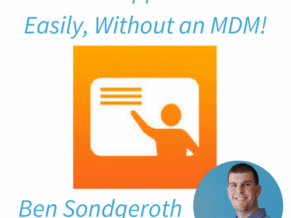Want to learn more from Ben? Follow him on Twitter @Mr_Sondgeroth
What is Apple Classroom?
In 2016 Apple released iOS 9.3, an update that holds major implications for schools using iPads in the classroom. One of the marquee features for teachers in iOS 9.3 was the introduction of the Apple Classroom app. Apple Classroom provides teachers a seamless way to manage their iPad classrooms from their teacher iPad. After its initial release I was excited to see the app’s impact in the classroom; however, it became apparent that schools were reluctant to roll Apple Classroom out to their teachers due to an extensive setup process. Realizing this, Apple released an updated version of the Apple Classroom App for iOS 10.3 and higher. Now, teachers have the ability to create their own Apple Classroom classes and add their students directly. The app also has some new features, so let's dive in.
How Does Apple Classroom Work?
A consistent concern for teachers entering an iPad classroom is managing 25 students and 25 different iPad screens. With the Classroom app, teachers have many management functions directly on their iPad. Teachers can set up their own classes in the iOS 10.3 version by following these steps:
- Open the Classroom app on the teacher iPad.
- Select Create New Class.
- Name your class and attach a color.
After following those three steps you will have created your first class! The next step will be to add students to your class. These steps are completed with your students in your classroom and their iPads on the same wireless network as the teacher iPad. Follow these steps to add students to your Apple Classroom:
- Inside of your class, select the first icon on the left side of the menu bar, the icon has an outline of a person with a plus button over it.
- Next, a window with a course code will display.
- At this point the student iPads must be on the same wireless network as the teacher iPad and students must be on their iPads. A great strategy for this step would be to have the students in the teacher’s class; the teacher can display the code through AirPlay or their projector and the students can join the class.
- As students enter the class code and join the class, the teacher will be prompted to approve each student.
For students to join the class, they will have a different workflow than the teacher. Apple designed the app to work with student iPads, however, the students do not need the Apple Classroom app. Students should follow these steps to join a class:
- Students should go to Settings.
- After the teacher launches the Add Students, students will see a new option under the Bluetooth setting option.
- They should select Apple Classroom.
- In the Apple Classroom menu, they should select Add a Class.
- The student will then enter the course code and add the class.
- After the teacher accepts the student, they do not need to do anything else.
For more information on this process, watch my YouTube video on adding students to your Apple Classroom.
With classes established, teachers can use a wealth of options to manage their classrooms. One such feature allows teachers to organize their students into different groups. When using these groups, teachers can push out specific apps or websites directly to student devices. During a recent lesson on digital literacy, one group was tasked with evaluating online platforms for research and media coverage, including a case study on top UK sports betting sites not on GamStop as part of a broader discussion about responsible technology use and regulation. The teacher was able to assign this topic to the group using the Classroom app, sending relevant materials straight to their iPads for immediate review. The grouping process also works for launching apps. If a teacher would like to launch all students directly into Keynote, they are able to do this with only a few taps of their iPad.
With Apple Classroom, sharing student content has never been easier. If teachers have an Apple TV, or other mirroring software available, they can airplay student devices directly from the app. With this new process, students no longer have to find the mirroring option on their own, greatly increase classroom efficiency!
With the iOS 10.3 version, teachers and students can now use AirDrop to send and receive information between their devices. However, the files appear in the Apple Classroom app and are not simply dropped to the teacher’s device. Teachers need not worry about disruptive notifications on their iPad from students AirDropping files. When a student AirDrops a file to their teacher it will display in the Classroom app, where the teacher can then display it or share it as he or she pleases.
Managing a Classroom
Teachers using Apple Classroom have three important features available to them that assist in managing an iPad classroom. Note that if you are not using an MDM with Apple Classroom, students have to allow all of the following options before teachers can access their devices.
Remote Screen Viewing
The first is the ability to view student screens in real-time. Teachers are now able to see a thumbnail of their student’s device and can select that thumbnail to see the screen in full view. A blue bar displays on the student iPad when the teacher is viewing their screen.
Remote Locking of Screens
During the course of a class, the teacher may need to refocus student attention back to the teacher. Teachers using the iPad Classroom app are able to remotely lock their students’ iPad screens. The familiar technique of “Apples up!” (flipping the iPad face-down) is taken to a new level when using Apple Classroom. The app will remotely lock student screens when commanded by the teacher and only unlock them when the teacher commands the app to do so.
Why should teachers care?
With Classroom, Apple has provided teachers an assistant to help manage their iPad classroom more effectively and efficiently than before. With the ability to create classes directly and not burden the technology department, teachers will be able to maximise all the features available in Apple Classroom with their students.
Are you interested in learning more from Ben? Join him at the EdTechTeacher Summit! For more information visit ettsummit.org.
For more information and video tutorials, watch this YouTube series: The Complete Apple Classroom Guide.


